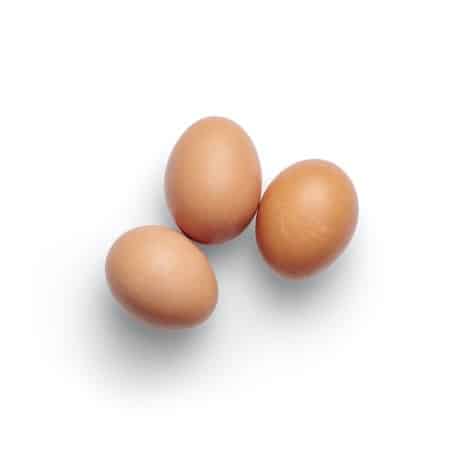Barred Rocks typically start laying eggs around 18 to 22 weeks of age (about 5 months). Take this as a general rule of thumb though, every chicken matures at its own pace. Don’t be concerned or surprised if your Rocks take a few weeks longer.
Table of Contents
How Many Eggs Do Barred Rock Chickens Lay?
Plymouth Barred Rocks are great layers. If you’re after a backyard breed that will keep you supplied with a steady flow of fresh eggs, they’re up there with the top layers.
I’ve heard of all sorts of estimations, but the best estimate seems to be that a Barred Rock hen will lay around 200 eggs a year in ideal conditions.
That’s a lot of eggs!
That works out at about 4 eggs per week. If you have 3 or more Barred Rocks, you’re going to be spoiled with the number of eggs you find in their boxes.
There really aren’t that many common backyard breeds that lay a lot more. Rhode Island Reds, Leghorns, and some hybrids come to mind as they can lay in the 250-300 range.
What Color Eggs Do Barred Rocks Lay?
They lay light brown colored medium to large eggs. Basically, the ‘classic’ shape, size, and color egg you expect to see in supermarkets.
Unless you’re like me and like white eggs, that is. You can check out some of the common white egg-laying breeds here if you’re interested to know which hens lay white eggs.

How Long Do Barred Rocks Lay Eggs?
Barred Rocks follow a typical laying lifespan as most traditional breeds that lay on the higher end of the scale.
You can expect them to hit their laying prime at around 2 years of age. Then, you will see a decrease in production of about 10% each year.
They have a life expectancy of around 6-8 years. So, if you want to try and work out some (very) rough numbers on how many eggs a Plymouth Barred Rock will produce in its lifetime, it looks like this;
They start laying around 5 months old. All chickens start out laying ‘pullet eggs’ though, which are smaller than their average egg size.
You can expect somewhere in the region of 200 eggs in their first full year. Then 180, 160, 140, 120… then as they start to reach their ‘twilight’ years, you can expect egg production to taper off even faster.
I think saying that a Plymouth Barred Rock will lay 800+ eggs in its lifetime is a reasonable assumption.
Related - When do wyandotte chickens start laying eggs?
Some History and Facts About Barred Rock Chickens
Barred Rocks have a distinctive looking plumage. It’s one of the main features that makes them so unique - and it’s the reason they are called ‘barred’!
They were originally bred as a dual-purpose bird, as so many breeds are. Today it’s most commonly seen in the backyard setting and enjoyed for its docile temperament, ability to adapt to weather conditions, and producing a lot of eggs.
There are a lot more to these ‘barred’ colored chickens though, here are some interesting facts:
Some quick facts:
- Barred Rocks are not a breed, the breed is Plymouth Rocks, ‘barred’ refers to their patterned plumage
- The Plymouth Rock was first seen in Massachusetts in the nineteenth century.
- The barred plumage pattern was the first color of Rock to be added to the Standard of Excellence of the American Poultry Association in 1874.
- Hens weigh around 6.5 lbs, and bantams are 2.5 lbs.
- Roosters weigh around 7.5 lbs, and bantams are 3.0 lbs.
Where To Buy Barred Rock Chickens, Chicks, and Hatching Eggs
I buy all of my chicks and hatching eggs online at Cackle Hatchery. They’re NPIP registered, have been in business since 1936, and in my experience have awesome customer service.
At the time of writing this, Cackle Hatchery had Barred Rock chickens for as low as $1.95/ea. They also had pullets available, and hatching eggs for around $3.76/ea.
Personally, I love hatching eggs. There are few things more amazing to witness and experience than seeing baby chicks hatch and enter the world!
You can check out the latest prices and availability for Plymouth Barred Rocks by clicking here.
Are Barred Rock Chickens a Good Choice for a Backyard Breed?
I’m not biased, I’m the first to say when a particular breed of chicken isn’t ideal for backyard settings. But Plymouth Rocks are one of the best backyard breeds, and the Barred variety is a favorite amongst the backyard community.
They are hardy, docile, and not known to be prone to any health issues. Which, in a nutshell means they’re pretty low maintenance.
Rocks are fun to be around, and very rewarding to raise. They’ll happily follow you around, graze for bugs, and cluck away with each other.
Then there are the eggs, lots of eggs! This is the main reason they are so popular with the backyard and homesteading community. With a few Rocks in your flock, you could even start up a little side business selling eggs if you wanted to.
Resources
Image credits - Photos by Jacalyn Beales and Mockup Graphics on Unsplash




